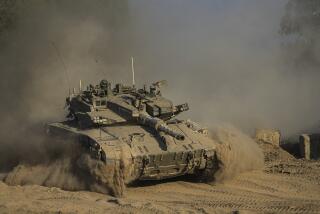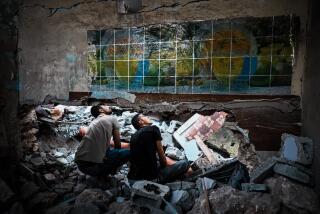Day of Attacks Challenges the Interim Government
BAGHDAD — The assassination of a provincial governor and the first major car bombing in Baghdad since Iraq’s interim government took power gave fresh evidence Wednesday of insurgents’ intentions to carry on their rebellion.
Osama Kashmoula, governor for five months of Nineveh, the northern province that includes the city of Mosul, was ambushed with machine guns and grenades while traveling in a convoy north of Tikrit in an area known for its loyalty to ousted Iraqi President Saddam Hussein.
Lt. Gen. David H. Petraeus, the former U.S. commander in Mosul charged with reestablishing Iraq’s national army and security forces, praised Kashmoula as a “courageous, committed and determined governor.”
“His loss is a terrible blow,” he said.
Although initial reports about the attack were sketchy, one U.S. source said it was reported that two of the attackers were killed, a third was captured, and a fourth was wounded and under guard at a hospital in Bayji, an oil refining center near the site of the attack.
At least one other governor has been killed since the U.S.-led occupation of Iraq began last year -- in Irbil province in a February suicide bombing. At least eight police chiefs, the president and a fellow member of the now-disbanded Iraqi Governing Council, a cultural affairs officer for the Education Ministry, a deputy foreign minister, a deputy governor and numerous other Iraqi officials also have been assassinated in the last 15 months.
In Baghdad, interim Prime Minister Iyad Allawi spent two hours at the scene of a morning truck bombing just outside the Baghdad Convention Center at one of the entrances to the heavily fortified Green Zone, the district in the center of the capital that serves as headquarters for the Iraqi government, the new U.S. Embassy and a host of military commanders.
The death toll rose to at least 10, including four Iraqi national guardsmen, with about 40 people injured, hospital officials said. The dead included Iraqis who worked for the U.S.-led military forces. Flying shrapnel injured a U.S. soldier.
As U.S. helicopters swooped overhead and police fanned out through the area, Allawi condemned the “naked aggression against the Iraqi people,” and promised that tough security policies he had instituted would “bring these criminals to justice.” The attack, he said, may have been a reprisal for sweeps by his government’s revitalized police force in recent days.
“We think this is a response,” Allawi said. “We have caught some prominent criminals.... They are cooperating and have been divulging important information.”
This morning, another explosion that officials suspected was caused by a car bomb killed three officers outside a police station in Haditha, northwest of the capital, media reports said.
Farther north, the U.S. military reported, two soldiers were killed Wednesday near Tall Afar when their vehicle rolled down an embankment. More than 880 U.S. service members have died since the start of the war.
The blast Wednesday was the first major bombing in Baghdad in more than a month and the first since the June 28 hand-over of sovereignty to the interim Iraqi government.
The estimated 1,000-pound bomb left a crater 10 feet wide. Burned cars lined a wall that was partly blown away by the explosion, and twisted shards of metal littered the ground.
There were wrenching scenes at the local hospital and morgues, as relatives rushed to discover the fates of loved ones.
Although U.S. authorities said they suspected a suicide attack, one of the injured, Said Abed, said he saw the driver of the suspected bomb vehicle get out and walk away just before the detonation.
“There was a blue Kia pickup truck two cars away from my car. In it was a young man with long black hair and a red T-shirt,” he said at Yarmouk Hospital, where he was being treated for a pelvic injury. “The young man walked away, and then the explosion happened. I am sure he was outside the car.”
“They didn’t target us. They didn’t target the interim government. They targeted ordinary Iraqi people just trying to get to work,” said U.S. Army Col. Mike Murray, commander of the 3rd Brigade of the 1st Cavalry.
On the streets of Baghdad, the bombing was greeted more with disappointment than surprise. Residents said they had not really expected the Allawi government to gain control of the security situation so quickly.
“You can’t have a perfect thing in just two weeks,” said Hussein Isam, who owns a furniture shop across the Tigris River from the Green Zone.
A laborer in the same area, Mohammed Talib, 29, agreed. “We feel much safer nowadays. Crime is falling. Explosions take place, but fewer in numbers. Progress on security has been fast, but not complete,” he said.
Security officers had warned of a heightened danger Wednesday, an Iraqi holiday marking the overthrow of the monarchy in 1958. The vehicle exploded in a line of cars waiting to be inspected to enter the Green Zone, and Murray said that was proof of the effectiveness of the security measures.
The bomber “didn’t make it 10% of the way” into the various security layers outside the restricted zone, he said.
Special correspondent Ashraf Khalil, Times staff photographer Carolyn Cole and Saif Rasheed and Caesar Ahmed of The Times’ Baghdad Bureau contributed to this report.
More to Read
Sign up for Essential California
The most important California stories and recommendations in your inbox every morning.
You may occasionally receive promotional content from the Los Angeles Times.










